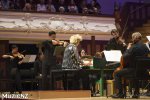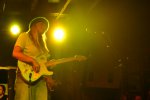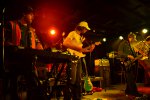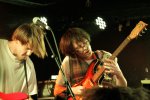Music News - Deaf Awareness Week: Listen Loud and Lose It
21 September 2008 - 0 Comments
Deaf Awareness Week (22-28 September 2008)
Nearly half of New Zealand’s youth have potentially damaged their hearing by the time they reach 25 years of age.
This startling fact was revealed in the National Foundation for the Deaf’s latest survey to launch Deaf Awareness Week 2008 with the message “Listen Loud and Lose It.”
The Market Knowledge survey conducted with 18-25 year olds showed 48% of respondents have experienced ringing in the ears for a few hours, or more, after listening to music. Of those who have experienced ringing or dullness in the ears, 94% have suffered for a day or more.
Commonly known as tinnitus, ringing, buzzing or humming in the ears, is often the first sign of hearing damage.
Marianne Schumacher, executive manager of the NFD says it is so important to educate Generation Y about how to enjoy music so they don’t pay for it later.
“Prolonged exposure to excessive noise can lead to permanent hearing loss. While this doesn’t threaten lives, it has a major impact on a person’s quality of life through impaired communication and the social isolation that hearing loss can bring.”
The survey showed 87% of respondents listen to music on a daily basis, in many different locations and using a repertoire of listening devices – in the car (48%), on laptop or computer (40%) and on a personal music device (37%).
A frightening 12% listen to music for up to 12 hours per day. Home is the most common place to listen to music (96%), followed by the car (83%) and at work (53%).
Generation Y is used to having a choice of when and where they enjoy their music and for many it is a very major part of their life.
Three quarters of the people that listen to music regularly said it sounds better louder. Younger people (18-20) and females in particular, are most likely to turn it up to a high volume.
It is not just the volume that music is being listened to but the number of hours. 85dB for 8 hours per day is deemed a safe limit but increase that level by just 3dB, and you need to drop the exposure time by half, i.e. 4 hours to keep within a healthy range of exposure. So listening to 95dB would be safe for about 30 minutes per day. However, many people are listening to their iPods at a volume up to 115 dB and a concert can get as loud as 120dB.
Some of those who know best about why not to listen to music at constantly high volumes are the musicians themselves.
New Zealand band, Autozamm’s lead singer and bass guitarist have both been affected by hearing damage and take a strong view on protecting their hearing.
Ollie Gordon 28, Bass player for Autozamm recalls two gigs he went to see where the damage to his ears caused constant ringing for three days following the concert.
Since then he carry’s earplugs with him, “following those experiences I went out and got a $15 set of earplugs and carry them on my key ring. It’s the smartest thing I have ever done!” says Ollie.
He went on to say that allowing yourself to suffer this damage whilst enjoying music is ridiculous as it is so easily avoidable if you take the right precautions.
Nick Major, 26 year old lead singer for Autozamm says he used to think using hearing protection would negatively affect his performance as a vocalist.
“After years of gigging without ear plugs I’ve been left with a permanent low frequency hum that isn’t fun to live with! If you're concerned that plugs could affect music quality, do what I eventually did - see an audiologist and get them made to your specific requirements. I don’t perform without them.
Yet trying to get the message through is proving difficult.
Over half of the respondents know that ringing or dullness in the ears is an early sign of hearing damage but they seem to have a ‘devil-may-care’ attitude towards protecting their hearing.
Around half (48%) said they would wear ear protection/ear plugs if they were made available free at music venues and concerts. But 29% said they wouldn’t wear ear plugs because they believed the plugs reduced sound quality and they didn’t want to look uncool. Males, more than females, were concerned how they might look to their mates and were worried they’d be hassled by their friends for being ‘soft’.
“Music is a wonderful thing to be enjoyed. We’re not trying to be the ‘Noise Police’ but to get the younger generation to understand that it doesn’t have to be so consistently loud. The longer you listen to it loud, the greater the chance of doing irreparable damage. Just turning it down a bit could make the difference between being able to enjoy the music in later life, or not,” said Ms Schumacher.
Ironically, while 65% of those who go to concerts never bother to protect their hearing, 44% said that iPods and MP3 players should have a volume restriction built into them.
More Info:
http://www.bebo.com/nfdnz
http://www.nfd.org.nz/
If you are a music fan it's likely you go to clubs and gigs a lot, but it's even more likely that you use an MP3 player or personal stereo every day. Find out how to listen safely what ever you are doing below:
Going to a club, gig or festival?
• Use chill out areas to give your ears a rest.
• Avoid dancing or standing beside loud speakers.
• If you want to watch the main act at the front of the stage, watch the support from further back.
• Wear earplugs designed for listening to music at clubs if you go to gigs regularly. These earplugs don't effect how the music or speech will sound.
Tips for protecting your hearing when listening to your MP3 Player:
• Take regular breaks from your headphones to give your ears a rest.
• Turn down the volume a notch - even a small reduction in volume can make a big difference to the risk of damage to your hearing.
• Avoid using the volume to drown out background noise, for example the sound of the train or traffic (find out about additions to in-ear headphones that help with this problem).
• If your MP3 player has a 'smart volume' feature, use it so you have control of the volume you are listening at
Looking for good quality earplugs?
EarBuddies is all about providing musicians and music-lovers who listen to loud music with affordable, good quality earplugs that don't muffle or affect the quality of sound they're hearing, but that will still protect ears from suffering hearing damage. The earplugs are discrete, reusable, comfortable and a great investment. For Deaf Awareness Week they have a special discount going - use the code "DAW" when purchasing online and get $5 off any pair of earplugs. Prices range from $30-$50.
www.EarBuddies.co.nz
Most Viewed Artists
Latest Galleries
NZ Top 10 Singles
- TOO SWEET
Hozier - BEAUTIFUL THINGS
Benson Boone - LOSE CONTROL
Teddy Swims - LIKE THAT
Future And Metro Boomin feat. Kendrick Lamar - END OF BEGINNING
Djo - I LIKE THE WAY YOU KISS ME
Artemas - WE CAN'T BE FRIENDS (WAIT FOR YOUR LOVE)
Ariana Grande - STICK SEASON
Noah Kahan - TEXAS HOLD 'EM
Beyonce - LEAVEMEALONE
Fred Again.. And Baby Keem








 Report A Problem
Report A Problem


There are currently no comments for this article. Please log in to add new comments.